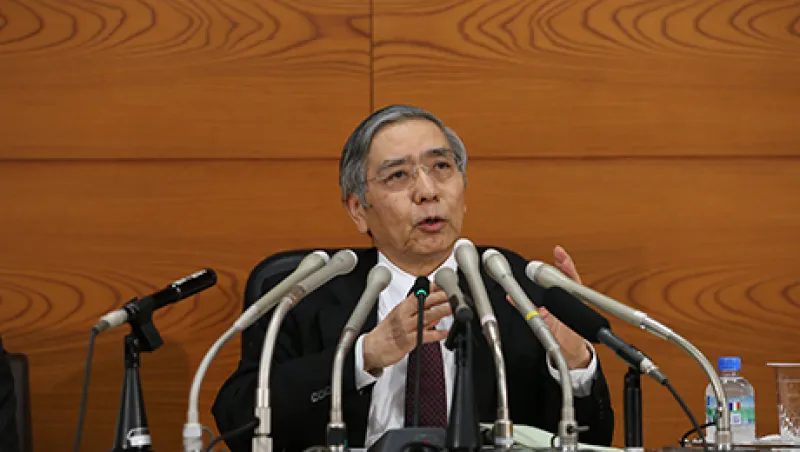Today Japan’s largest bank, Mitsubishi UFJ Financial Group, announced full fiscal-year profits that were 11 percent lower than last year, as Bank of Japan monetary policy hurt lenders. In statements accompanying the release, Mitsubishi executives noted that ultralow and negative interest rates had eroded interest margins and said the environment remains challenging. The announcement follows similar concerns raised last week by senior executives at Mizuho Financial Group and Sumitomo Mitsui Financial Group. Perhaps the starkest example of the shift in banking caused by the unprecedented rate environment is a recently proposed law in Portugal that would mandate that mortgage lenders offer negative rates to consumers if underlying benchmark rates are negative. With the world turned upside down for traditional banking, the question is what the long-term effects of extreme monetary policy will be on the global financial-services industry.
Norwegian sovereign fund to join class action. In a statement issued earlier today, Norges Bank Investment Management, the operational management wing of Norway’s sovereign wealth fund, announced that it intends to join legal actions by Volkswagen shareholders over falsified emissions-testing data. The fund, which has assets totaling roughly $850 billion, currently owns more than 1.5 percent of the German automaker.
Phillips announces lighting IPO. Royal Philips announced today it will sell a 25 percent stake in its lighting division in an initial public offering expected to raise more than $1 billion. The flotation comes after the company was unable to find a private buyer for the lighting business as it shifts its focus to healthcare and consumer staples.
Energy companies announce merger. In the first major merger of the week, natural-gas and oil producer Range Resources Corp. announced an agreement to acquire Memorial Resource Development Corp. in an all-stock transaction valued at roughly $3.3 billion in market capitalization, including more than $1 billion in debt. Range executives expressed confidence that the purchase will leave the company well situated for a return in natural-gas demand.
Chinese data weaker than forecast. Over the weekend, statistics released by China’s National Bureau of Statistics were softer than anticipated by economists, underscoring challenges remaining for policymakers. Industrial production figures for April expanded by 6 percent year-over-year versus consensus forecast for 6.5 percent while the headline retail-sales index climbed 10.1 percent versus April 2015, also falling short of expectations. Even as property markets continue to expand, the pace of overall urban fixed investments moderated for the month to 10.5 percent year-over-year versus 10.7 in March.
Hong Kong flash crash. A sudden, sharp correction drove the Hang Seng China Enterprises Index from a gain of 1 percent to a decline of 1.5 percent in less than two minutes during Monday trading. Dually listed shares on the Shanghai exchange were unaffected by the selloff. Officials at the Stock Exchange of Hong Kong have not reported any erroneous trades, suggesting that the move was precipitated by large block-order sales.
Institutional investors flock to Chinese aircraft leasing IPO. According to a Bloomberg report, investors signed on to participate in Bank of China’s initial public offering of its aircraft leasing division include China Investment Corp., Boeing and Oman’s sovereign wealth fund. The listing of BOC Aviation is expected to raise more than $1 billion as Bank of China divests 52 percent of the firm.
Portfolio Perspective: Unabated — Bryan Reynolds, New Albion Partners
The incredible surge of new corporate bond purchases continues unabated. Last Tuesday, credit investors scooped up more than $13 billion of new corporates. That means that May is off to the second-best start ever.
Such a statement would have been unthinkable to most investors just three months ago when financial markets were in the midst of panic. It is no surprise to our readers, though, who saw the record amount of pension votes aimed at credit even in the darkest days of winter. These flows will generate even more buybacks and M&A designed to boost share prices.
Interestingly, one of the deals on Tuesday was for a company that already went private. Kraft Heinz did a $5 billion issue with ten- and 30-year maturities. Keep in mind that stock valuations are so low that this company was able to go private yet still maintain an investment-grade rating. Warren Buffett got a steal because there were no other bidders! The proceeds of the deal were to redeem high-cost preferreds and for “general corporate purposes”. Given how cheap equity valuations are, we think that general corporate purposes for this company likely means more acquisitions.
While these flows should eventually push stock prices higher, we still believe that it will be a gut-wrenching summer given equity investors’ dislike of stocks. The short-interest data for the second half of April was released yesterday, and it showed only a small amount of short covering.
Bryan Reynolds is the chief market strategist for New Albion Partners in New York.






